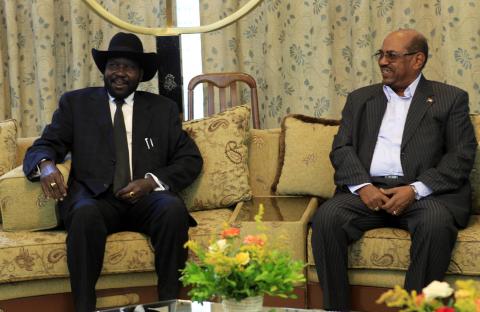Advertisement
Sudan Lifts Threat To Block South Sudan Oil, Foes Vow To Mend Ties
KHARTOUM (Reuters) - Sudan lifted a threat to block oil exports from its old enemy South Sudan, as the leaders of the African neighbours met on Tuesday and promised to end their festering conflicts.
The countries have fought over disputed territory and accused each other of fuelling rebellions in their territories since the South declared independence from Sudan in 2011.
Under international pressure to reach a deal and boost stability in a fractured region, South Sudan's President Salva Kiir and his Sudanese counterpart Omar Hassan al-Bashir held a one-day summit in Khartoum.
At the start of the meeting, Bashir and Kiir said they would honour all the bilateral agreements they had already signed. "The agreements we signed call for the transport of South Sudan's oil through Sudan's facilities and ports," Bashir said later.
Sudan had earlier this year threatened to stop the landlocked South shipping oil through its territory by Friday unless Juba cut ties with rebels operating across their almost 2,000-km (1,300-mile)-long shared border. South Sudan denies supporting the insurgents.
A shutdown would have cut off South Sudan's main source of government income - and robbed Khartoum of the export fees it needs to stabilise its economy reeling from the loss of most crude reserves with the southern secession.
The oil exports, mainly bound for Asia, had only resumed in April after the South itself closed the pipelines for 16 months during a dispute over those fees.
"A NEW PAGE"
Both countries have signed several agreements over recent years to overcome their disputes, but the pacts have been undermined by deep mutual distrust.
"We want to leave the problems of the past behind us and open a new page for the benefit of the two people," Bashir told journalists. But he again said any Southern support of rebels would have to stop.
Kiir also said he wanted a new chapter in bilateral ties and open the joint border for trade, a move agreed in September but not implemented by Sudan due to Juba's alleged rebel support.
"You closed the border. We didn't do that but we're ready to reopen it within 24 hours," Kiir said, during only his second visit to Sudan since the split. He again denied backing rebels.
Bashir and Kiir also signed an agreement to boost cooperation of business people from both countries.
South Sudan produces around 200,000 barrels a day, diplomats say, less than the 300,000 bpd before the oil shutdown as it takes time to restart hundreds of wells. Its oil fields are mainly operated by Chinese, Indian and Malaysian firms.
South Sudan seceded under the terms of a 2005 peace deal with the Khartoum government that ended one of Africa's longest civil wars. Around two million died in the decades-long conflict fuelled by religion, oil, ethnicity and ideology.



















Add new comment